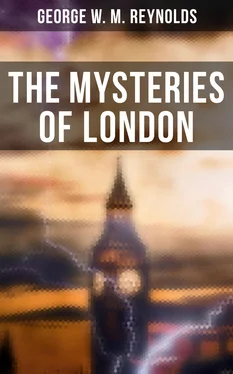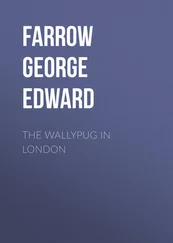"When we arrived there, after an absence of two months, we made a most unpleasant discovery—unpleasant to Dick as the brother, and to me who was enamoured of Mary. She was in a way to become a mother; her situation was too palpable to be concealed. Dick flew into a most ungovernable rage; and Mary tried to deny it. But the fact was glaring, and she was obliged to confess that she had been seduced by a serjeant of the regiment stationed at Canterbury. Her attachment to that man, and the hope that he would do her justice, were the reasons that had induced her to remain at Canterbury, when we went to London. The serjeant had recently treated her with neglect and indifference, and she longed for revenge. Dick and I swore that she should have it. She told us that the serjeant was very fond of angling, and that every morning early he indulged in his favourite sport in the river Stour, which flowed close by the barracks.
"Next morning Dick and I went down to the river, and there we saw the serjeant preparing his tackle. From the description we had received of him, we knew him to be the man we wanted; but there was a large water-mill close by, and we dared not attack him in a spot that was so overlooked. We accordingly returned home, and consulted together how we should proceed. At length we resolved that Mary should endeavour to get him to grant her an interview on the banks of the river. She sent him a note, saying that she was to leave Canterbury in a few days, and that she wished to see him once more. She concluded by begging him to meet her that evening or the next between nine and ten o'clock, close by the bridge of Kingsford's water-mill. He consented, and appointed the evening of the next day for the interview.
"The hour drew nigh, and Mary went to the place agreed upon. Dick and I followed her at a little distance. The night was dark; it was in the month of April; and the air was very cold. As we drew near the bridge as noiselessly as we could, we distinguished the forms of two persons standing upon the bridge, and leaning in earnest conversation upon the low railing that overhung the huge wheel which was revolving beneath, the torrent pouring over it through the sluices of the dam upon the top of which the bridge stood. We advanced closer; and could then perceive that the two forms were those of Mary and her seducer. We proceeded to the bridge. When we reached the middle, Dick went up to the serjeant, and said, ' This is my sister; do you mean to do her justice? '—' No, ' cried Mary; ' he has just told me that I need have no hope in that respect .' ' Then there is nothing more to be said, ' exclaimed Dick Flairer; and at the same moment we precipitated ourselves upon the serjeant. Dick Flairer pressed his hand upon his mouth; the poor wretch struggled violently; but in an instant we hurled him over the bridge-railing. He fell upon the wheel; the roar of the torrent, and the din of the ponderous machine drowned his last cry of agony, and the crushing of his bones. ' Now, Mary, ' said I, ' you are revenged .' She pressed my hand convulsively, without uttering a word; and we returned to our lodgings.
"Next day, the body of the serjeant was found, fearfully crushed and mutilated, a mile below the mill, entangled in a bed of osiers. It was carried to the barracks: an inquest was called; and a verdict of ' Found Drowned ' was recorded. Not a suspicion was entertained that the man had been murdered, it being evident from the surgical examination that he had been crushed by the wheel of the mill, upon which it was supposed he had accidentally fallen, over the bridge-railing, which was only about three feet high.
"The moment the verdict was returned, and we saw that no suspicion attached to any body in reference to the murder, we left Canterbury, and repaired to London. In the course of a few weeks, Mary became the mother of a still-born child; and in due time I assured her that I would overlook her fault, and marry her if she would have me. She was pleased with the proposal; and Dick readily agreed to it. But before we could be spliced, I one day met the goldsmith of the Strand in the street; and he gave me into custody. I was taken before the magistrates, and fully committed for an attempt to rob my employer. While I was in Newgate, waiting for my trial, I was greatly alarmed lest the old gentleman, whom I had robbed at the auction mart, should prefer an indictment against me; but my fears in this respect were unfounded. At length the sessions commenced, and I was put upon my trial. The Sheriffs had supplied me with counsel, for I was completely without funds when I was arrested. The barrister thus retained in my behalf, advised me to plead guilty, as I should then stand a good chance of escaping transportation. I followed his recommendation, and expressed my contrition for the offence. The Recorder read me a long lecture, and condemned me to seven years' transportation, which sentence was commuted to two years' imprisonment in Newgate.
"During that time I seriously thought of mending my ways, when I should be once more at liberty. But I could not conceive what on earth I should do for a livelihood if I did not steal. I knew that I should be turned adrift without a penny in my pocket; and I had no friends but those with whom I could only pursue my old career. When the chaplain spoke to me upon the errors of my past life, and the necessity of reformation, I used to say to him, ' Show me, reverend sir, how I am to obtain an honest living when I leave these walls, and I never shall sin again. ' But he always gave an evasive reply. In fact, what could he say? If he had required a man-servant—a groom—an errand-boy—a menial scrub to black his boots and brush his clothes, would he have taken me? No. If he had known any friend who wanted a man to take care of his hounds—never enter his house—but sleep in the kennels along with the dogs, would the chaplain have recommended me? No. If the governor of Newgate had needed a man to sweep the dirt away from the front of the prison, would the reverend gentleman have spoken a kind word in favour of me? No. Of what use, then, is it for these gaol chaplains to preach penitence and reformation, when by their very actions they say, ' We do not believe that you can possibly change for the better? ' Of what benefit is it for these salaried moralists to declaim upon the advantages of a virtuous course, when they know perfectly well that the old maxim is invariably correct—' Give a dog a bad name and hang him! ' Virtue must be fed; but Virtue, upon leaving the walls of a criminal prison, can obtain no food. Must Virtue, then die of starvation? Human nature revolts against this self-destruction—this systematic suicide; and, sooner than submit to it, Virtue will allow itself to be changed by circumstances into Vice. Virtue in this case has no option but to become Vice.
"I often thought, when I was in prison, that if there was a workshop, established by the government to receive persons whom the criminal gaols daily vomit back upon society, many a miserable creature would in reality reform, and be saved from a re-plunge into the sea of crime. But all that the government does is to punish. I mentioned these thoughts to the chaplain. And what did he say? He endeavoured to get rid of the necessity of giving a decisive opinion, by throwing himself headlong into a mass of argument and reasoning, half religious and half political, which I could not understand. Thus do those men invariably extricate themselves from perplexing topics. In my opinion there is no mockery more abominable—no hypocrisy more contemptible—no morality more baseless than the attributes of a gaol-chaplain!
"If good and pious men attended criminal prisons of their own free will, and talked in a plain homely manner to the inmates—a manner which those inmates could understand—how much benefit might result! But when you think that the chaplain only troubles himself about you because he is paid—that he doles out his doctrine in proportion to the income which he receives—and that he says the same to you to-day which he said to another yesterday, and will say to a third to-morrow—his office is mean, contemptible, and degrading.
Читать дальше












